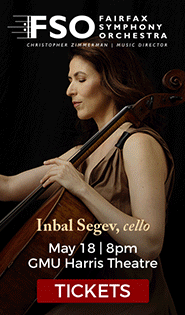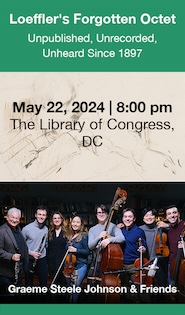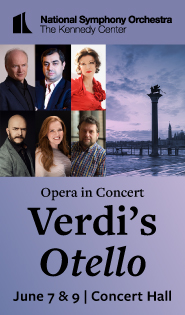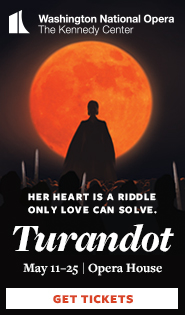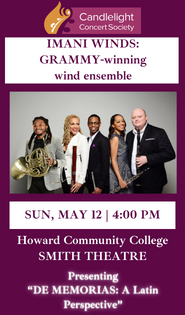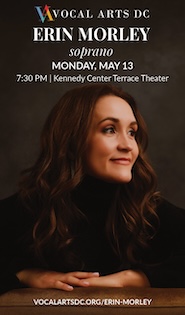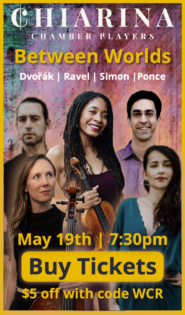Washington Douglass Chorale begins life in promising fashion with diverse Christmas concert
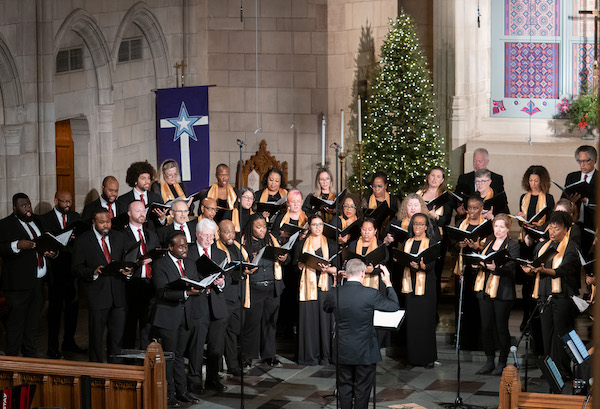
Scott Tucker conducted the inaugural concert of the Washington Douglass Chorale Sunday night at National United Methodist Church. Photo: Tom Sliter
When Scott Tucker stepped down from the leadership of Choral Arts Society of Washington last year, he did not announce any future plans. As it turns out, the esteemed conductor has co-founded a new ensemble in the city’s already crowded choir scene with Nolan Williams, Jr. Williams and Tucker led the first concert by their new group, the Washington Douglass Chorale, before a capacity crowd Sunday evening at National United Methodist Church.
As noted earlier this season, Choral Arts had to turn to Tucker for help when his successor, Jace Kaholokula Saplan, departed after only one season, reportedly resulting from a difference in artistic vision. (That venerable chorus is currently in the search process for a new music director.) Rather than trying to transform the repertoire of a long-established ensemble, Tucker and Williams decided to found an entirely new choral group with an emphasis on racial equality. That mission is manifest with the group being named after Frederick Douglass, who escaped from slavery on the eastern shore of Maryland to become a celebrated abolitionist, orator, and writer.
To that end, the Douglass Chorale places white and black singers and their musical traditions on equal footing, with the musical direction shared evenly between the two co-founders and a diverse board. D.C. Mayor Muriel Bowser recognized this genuine effort toward fostering racial harmony in a letter, which was read by the city’s Secretary of State, Kimberly A. Bassett.
The group’s inaugural concert took a decidedly conventional form, akin to a contemporary Lessons and Carols service. The choir entered in a procession down the long center aisle, carrying electric candles and singing the Christmas plainsong “Of the Father’s Love Begotten,” in English translation and to varied organ accompaniment. Allison Seymour, morning news anchor for WUSA-9, read a number of poems inserted between musical selections. After introductory remarks, the audience even joined in singing the traditional carol “O Come, All Ye Faithful.”
Tucker then led a performance of the Christmas Cantata (Sinfonia Sacra) by Daniel Pinkham, the American organist and composer with whom Tucker studied in Boston. A setting of three Latin texts proper to Christmas, the work weaves together intricate contrapuntal lines, often in complex rhythms. Written to be accompanied by brass, this performance replaced the second brass quartet with organ. The slow, mysterious middle movement featuring soft treble voices is followed by the louder, lighter final movement, capped by a dancing Alleluia section.
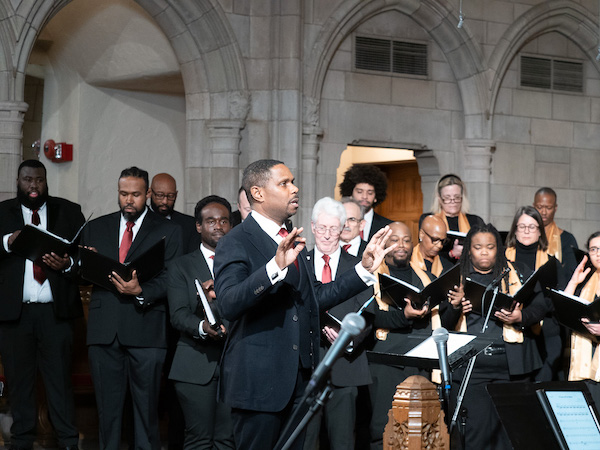
Co-founder Nolan Williams Jr. conducted selections Sunday night as well. Photo: Tom Sliter
Demonstrating the choir’s founding principles immediately, Williams then conducted two works about the three Magi and their visit to Christ’s manger on Epiphany. The first, by African-American composer Margaret Bonds, focused on the possible African origin of one of these three kings (“Could He Have Been an Ethiope?”), a pleasing work with an elegant flute solo played by Daniel Dickinson. An unaccompanied choral arrangement of German composer Peter Cornelius’s “The Three Kings” prominently featured the vocally strong men of the chorus.
A similar pairing on the subject of the Virgin Mary matched contemplative music by Francis Poulenc (“O Magnum Mysterium”) and black Canadian composer Nathaniel Dett (“Ave Maria”).
It was difficult to assess the quality of the choir in terms of volume and balance, because their sound was amplified throughout. Further, the sound system experienced a couple of anomalies during the concert, resulting in scratches, hisses, and other noises. Individual voices were heard at different levels as well, with the soprano section sometimes unpleasantly over-present, especially in their less attractive upper register.
The peak of the programming featured the best of both choral traditions, beginning with the five-part motet “Hodie Christus Natus Est” by Jan Sweelinck. The musicians melded their voices with expertise and care, the tenors forthright on their opening calls (“Hodie hodie”), and all parts interlocking in the active, cheerful refrain (“Noe Noe”). This paired beautifully with something completely different, Williams’ own “Silent Night,” with the chorus enveloped by the bluesy muted trumpet playing of Joshua Kauffman and Andrew Fremder.
A medley of different arrangements of the tunes “O Holy Night” and “What Child Is This?” extended this modern approach to Christmas music, matched by Mark Butler’s Gospel-style arrangement of “Glory, Hallelujah to the Newborn King.” As a final sign of what will hopefully have a long life after this promising beginning, the concert ended with a world premiere, Williams’ new version of “Angels We Have Heard on High.” The two soloists, tenors Michael McKeon and Jonathan Hampton, proved the strongest solo voices of the evening.
This new chorus has room to grow, in terms of its overall sound and corporate quality, but this first outing showed extraordinary promise. The selections avoided pablum—offering top-notch repertoire from both choral traditions—and did not outlast its welcome, even in a 90-minute program without intermission.
Washington Douglass Chorale will present one more concert this season, a program about race in America planned for April 14, 2023. washingtondouglasschorale.org
